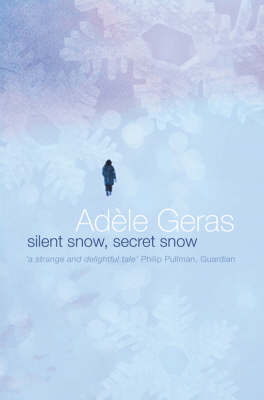I actually discovered this book by chance. Non Pratt of Catnip Publishing blogged about Gay Writes. Adèle Geras commented on the post about her novel silent snow, secret snow, and so I thought I would give it a go.
Originally published in 1998 (when I was 11!), silent snow, secret snow follows a family Christmas over five days. Eleven people and a cat, each with their own secrets. While there, they get snowed in, and the secrets become difficult to keep when they're unable to escape each other - even in such a big house.
Despite the varying ages of the characters in this book - Maestro, the eldest, being really quite elderly, and Ellie, the youngest, being only 13 - when reading, it's clear that this book is for the younger end of YA. A number of serious issues are discussed in this book, and they are discussed quite simply. I wouldn't say they were dumbed down; to me it feels like the book is aimed at those aged 11-13, and I think it discusses the issues brilliantly as an introduction to mature themes.
At 150 pages, this is quite a short book. Despite that, quite a lot goes on. The story is told in third person from all twelve characters' - yes, including the cat, Pamina - points of view. This may sound like it gets chaotic, but it isn't. One person's point of view could be half a page or up to about three pages, and more often that not, the start of each new narration is made apparent by the the time of day and which room in the house the character is in, and when not, paragraph breaks are used, so it's easy to follow.
As I said, there are quite a lot of various serious issues discussed in this book, but to talk about them would be to reveal the secrets and spoil the story. However, as Laurie's sexuality is revealed not only in the blurb, but from the very beginning of the book, it's fine to talk about. Laurie's sexuality is discussed just as simply as the other mature themes in the book.
Laurie is in love with Carlo, but nobody knows. Or rather, he's never told anyone that he's gay, let alone that he is in love with his best friend. The whole reason he invited Carlo to spend Christmas with his family is so that he can spend some time alone with him, away from school, and to try and pluck up the courage to tell him. That's a little difficult when family is absolutely everywhere, when Carlo seems to have a thing for his sister Marianne, and when his younger cousin Ellie seems have a crush on him too. One or the other, if not both, are always around. Apart from Laurie worrying a few times what his parents might think if he came out, this is pretty much the extent of Laurie's story.
What's great is that when certain people discover his sexuality, they don't really bat an eyelid. Marianne has suspected for quite a while that Laurie is gay, and she only feels more sure about her suspicions at Christmas when she sees the way he looks at Carlo. She remembers a conversation she had with her best friend Stacey the previous year (Stacey is the first to speak):
'"...Why don't you ask him?"
"What, just flat out, like that: are you gay?"
"Yes. Why not?"
"He might not want anyone to know," Marianne said.
"That's ridiculous," said Stacey. "There's nothing wrong with being gay."
"Well, I know that, and you know that," Marianne said, "but Laurie might feel embarrassed about it. Boys are a bit strange about stuff like that. He might not want to talk about it."' (p74)
And later, from Ellie's point of view, when Marianne divulges Laurie's secret to Ellie:
'Marianne thought Laurie was gay. Ellie had never met any gay people, so she didn't know what she thought about them, although of course if what Marianne said was true, then she did... she knew Laurie very well, and he was her favourite person in the world, after her parents and Marianne. It didn't matter a bit, she decided. Who cares if you like men better than women or the other way round? She certainly didn't.
"Is Carlo gay too?" she asked Marianne
"I don't think so," Marianne said. "Not judging by the way he's been coming on to me."
"Has he?"
"Oh, yes. Though he could be bi, of course."
...[Ellie] had vaguely heard of bisexuals - people who liked both men and women - but she didn't really understand how that worked and she was too embarrassed to ask Marianne, who would think she was a real baby.' (p80-81)
Both excerpts show not only the extent of which the discussion about Laurie's sexuality goes, but also an idea of how simply the story is written. I think silent snow, secret snow is a great way of slowing easing younger readers into LGBTQ fiction, as a way of bringing the subject up for a discussion with parents, without getting too heavy serious.
However, silent snow, secret snow is just a little too young for me. Thankfully it was a very quick read, otherwise I believe I would have gotten too frustrated. It was just too young for me to enjoy, and found the way the characters spoke quite annoying, almost as if they were very upper class, and I found it a little jarring. Not for me, but I do think it would be a great story for it's age-range. Unfortunately, silent snow, secret snow is now out of print, so if you wish to buy yourself a copy, you may have to buy a secondhand copy.
